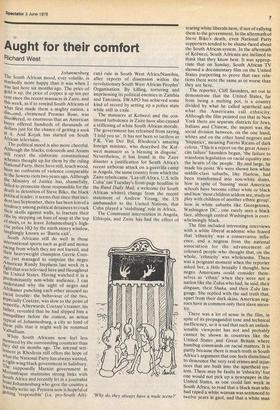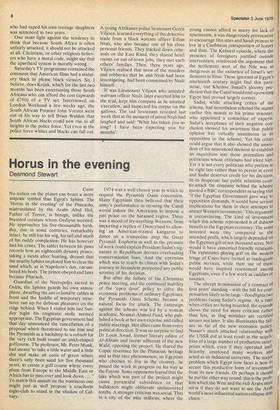Aught for their comfort
chard West
Johannesburg The South African mood, ever volatile, is markedly more happy than it was when I Was last here six months ago. The price of gold is up, the price of copper is up ten per cent since the recent massacre in Zaire, and this week, as if to remind South Africans of What first made them a mighty nation, a rhal.iond, christened Premier Rose, was discovered, so enormous that an American buyer offered hundreds of thousands of dollars just for the chance of getting a look at it. And Kojak has started on South African television.
The political mood is also more cheerful. Although the blacks, coloureds and Asians still reject the elaborate constitutional schemes thought up for them by the ruling National Party, there have still, touch wood, been no outbursts of violence comparable to the Soweto riots two years ago. Although the Ministry of Justice has, shamefully, failed to prosecute those responsible for the death in detention of Steve Biko, the black Political leader, it seems that since that incident last September, there has been less of a tendency among political detainees to crack their skulls against walls, to fracture their ribs by stepping on bars of soap at the top Of stairs, or to leave Johannesburg's highIlse police HQ by the ninth storey window, laughingly known as 'Bantu exit'.
South Africans still do well in those international sports such as golf and motor racing from which they are not barred, and their heavyweight champion Gerrie Coetzee just managed to outpoint the negro A.. illerican Randy Stephens last week in a Tight that was televised here and throughout the United States. Having watched it in a Predominantly non-white audience, I can understand why the sight of negro and Afrikaner punching each other aroused no racial trouble: the behaviour of the two, sPecially Coetzee, was slow to the point of 8°Porific. Afterwards, Coetzee's trainer, his father, revealed that he had slipped him a tranquilliser before the contest, an action tYPical of Johannesburg, a city so fond of these pills that it might well be renamed Valhanium.
White South Africans now feel less Menaced by the surrounding countries than t,heY did six months ago. The internal settleMent jn Rhodesia still offers the hope of What the National Party has always wanted, ,a right-wing black government in Salisbury. he supposedly Marxist government in mozambique maintains strong links with Sj.outh Africa and recently let in a journalist ,,r?rn Johannesburg who gave the country a triendly write-up. Pretoria now is hopeful of getting `responsible' (i.e. pro-South Afri
can) rule in South West Africa/Namibia, after reports of dissension within the revolutionary South West African Peoples' Organisation. By killing, torturing and imprisoning its political enemies in Zambia and Tanzania, SWAPO has achieved some kind of record by setting up a police state while still in exile.
The massacre at Kolwezi and the continued turbulence in Zaire have also caused a stiffening of white South African morale. The government has refrained from saying 'I told you so'. It has not been so tactless as P.K. Van Der Byl, Rhodesia's amazing foreign minister, who described the Kolwezi massacre as 'a blessing in disguise'. Nevertheless, it has found in the Zaire disaster a justification for South Africa's recent airborne attack on a guerrilla camp in Angola, the same country from which the Zaire rebels came. 'Lay off Africa, U.S. tells Cuba' ran Tuesday's front-page headline in the Rand Daily Mail, a welcome (to South African whites) change from the recent statement of Andrew Young, the US ambassador to the United Nations, that Cuba played a 'stabilising' role in Africa.
The Communist intervention in Angola, Ethiopia, and Zaire has had the effect of scaring white liberals here, if not of rallying them to the government. In the aftermath of Steve Biko's death, even National Party supporters tended to be shame-faced about the South African system. In the aftermath of Kolwezi, South Africans are inclined to think that they know best. It was appropriate that on Sunday, South African TV showed a documentary film on the United States purporting to prove that race relations there were the same as or worse than they are here.
The reporter, Cliff Saunders, set out to demonstrate that the United States, far from being a melting pot, is a country divided by what he called apartheid and what the Americans call ethnicity. Although the film pointed out that in New York there are separate districts for Jews, Italians and Chinese, the import was the social division between, on the one hand, whites and on the other hand negroes and fhispanics', meaning Puerto Ricans of dark colour. 'This is a report on the great American failure' Saunders began, `the failure to transform legislation on racial equality into the hearts of the people. By and large, he made his point. We were shown how white middle-class suburbs, like Harlem, had been transformed into non-white slums, how in spite of `bussing' most American schools have become either white or black and how `most children seldom see, study or play with children of another ethnic group', how in white suburbs like Georgetown, Washington DC., one rarely sees a black face, although central Washington is overwhelmingly black.
The film included interesting interviews with a white liberal academic who feared that 'ethnicity' was a conservative influence, and a negress from the national association for the advancement of coloured people who thought that, on the whole, 'ethnicity' was wholesome. There was a poignant moment when the reporter asked her, a little brutally I thought, how negro Americans could consider themselves as 'ethnic' when they were not a nation like the Zulus who had, he said, their dingaan, their Shaka, and their Zulu language. She replied with the sad truth that, apart from their dark skins, American negroes have in common only their slave ancestry.
There was a lot of sense in the film, in spite of its propagandist tone and technical inefficiency, so it is sad that such an unfashionable viewpoint has not and probably cannot be shown in countries like the United States and Great Britain where humbug commands on racial matters. It is partly because there is much truth in South Africa's argument that one feels disinclined to denounce the very real crimes and injustices that are built into the apartheid system. There may be faults in `ethnicity' but one would not pick up a newspaper in the United States, as one could last week in South Africa, to read that a black man who had raped a white woman was sentenced to twelve years in gaol, and that a white man who had raped his own teenage daughters was sentenced to two years.
One must fight against the tendency to think that because South Africa is often unfairly attacked, it should not be attacked at all. Christians, or other religious believers who have a moral code, might say that the apartheid system is morally wrong.
Saturday's TV programme contained the comment that American films had a statutory black to please black viewers. So, I believe, does Kojak, which for the last two months has been entertaining those South Africans who can afford the cost (upwards of £750) of a TV set. Interviewed on London Weekend a few weeks ago, the South African Premier John Vorster went out of his way to tell Brian Walden that South African blacks could now rise to all heights in the police force. Yet even in the police force whites and blacks can fall out. A young Afrikaner police lieutenant Gerrit Viljoen, learned everything of the detective trade from a black warrant officer Edian Ntuli, who also became one of his close personal friends. They tracked down criminals on the East Rand, they shared hotel rooms on out-of-town jobs, they met each others' families. Then, three years ago, Viljoen realised that most of the murders and robberies that he and Ntuli had been investigating, had been committed by Ntuli himself.
It was Lieutenant Viljoen who arrested warrant officer Ntuli, later escorted him to the trial, kept him company as he awaited execution, and inspected his corpse on the gallows. The sad lieutenant revealed last week that at the moment of arrest Ntuli had laughed and said: 'What has taken you so long? I have been expecting you for months'.



































 Previous page
Previous page